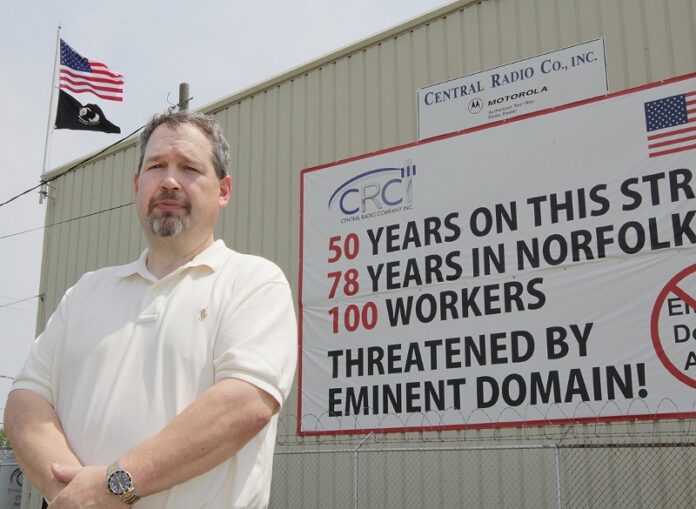
A business that says it said it is simply trying to protect its property rights lost their case in Norfolk this week. A divided panel of the 4th U.S. Circuit Court of Appeals ruled this morning that the City of Norfolk, Va. did not violate the First Amendment rights of Central Radio Company when it forced the company to take down a banner protesting the city’s illegal attempt to take the company’s property through eminent domain.
“Today’s ruling allows the government to play favorites with the First Amendment by arbitrarily deciding who gets to speak and what they get to say,” said Michael Bindas, a senior attorney with the Institute for Justice, which represents Central Radio. “We will ask the U.S. Supreme Court to review the decision so that all citizens can be free to speak out on the issues that matter to them.”
Central Radio has been a Norfolk institution for 78 years, but in 2009 the Norfolk Redevelopment and Housing Authority moved to take its land through eminent domain and turn it over to nearby Old Dominion University. In response, Central Radio hung a 375-square foot protest banner that read: “50 years on this street. 78 years in Norfolk. Over 100 employees. Threatened by eminent domain!”
City officials, acting on a complaint made by an official at the university, quickly cited the sign and ordered that it be taken down. Had Central Radio instead decided to hang the flag of a governmental entity, a religious symbol or something the city deemed a “work of art,” it could have done so without restriction under the sign code. In fact, when the city cited Central Radio, there were numerous banners that far exceeded the size of Central Radio’s protest banner throughout Norfolk.
Eventually, Central Radio defeated the city’s land-grab: In the fall of 2013, the Virginia Supreme Court held that the city’s attempted taking of Central Radio’s property was illegal, vindicating the business’s property rights. But the 4th Circuit ruled against what supporters insist are the business’ free speech rights.
In a divided 2-1 decision, the majority concluded that nothing about the sign code as written or as applied to Central Radio was improper and that the city’s purported traffic safety and aesthetics goals justified restricting Central Radio’s protest. The court noted that the city’s distinctions between different types of banners turned on what they depict, but held that such distinctions are permissible if they are deemed “reasonable.” In the end, the court deferred to the city, holding that whatever is “the precise restriction necessary” to carry out the government interests is a matter “best left to legislative bodies.”
“Unfortunately, this decision is a perfect example of the courts merely deferring to the government, instead of engaging with the real facts of a case,” said Bindas. “It is always the government’s burden to justify restrictions on speech, and courts should never rubber-stamp government’s crackdown on a citizen’s protest of abusive governmental behavior.”
Judge Roger Gregory issued the dissent from the majority’s opinion. “This case implicates some of the most important values at the heart of our democracy: political speech challenging the government’s seizure of private property—exactly the kind of taking that our Fifth Amendment protects against,” wrote Gregory. “If a citizen cannot speak out against the king taking her land, I fear we abandon a core protection of our Constitution’s First Amendment.”
“What the court has allowed is for the government to have an unfair advantage over its citizens anytime they try to speak out against it,” said Bob Wilson, an owner of Central Radio. “We will appeal to the Supreme Court because such a blatant violation of our basic constitutional rights cannot be allowed to stand.”
The 4th Circuit’s decision comes just one day after the U.S. Supreme Court heard arguments in Reed v. Town of Gilbert, which also involves the question of whether a municipal sign code can constitutionally treat some types of speech better than others. The court is expected to issue an opinion in that case this spring.
To learn more about this case, visit www.ij.org/central-radio-company-v-city-of-norfolk.


